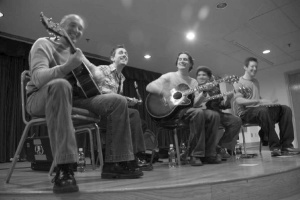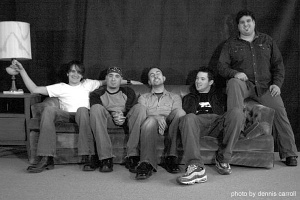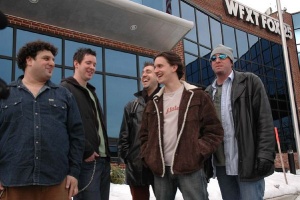 Boston Beats: Could
everybody please state your name, age, and current occupation for the record?
Boston Beats: Could
everybody please state your name, age, and current occupation for the record?
Chad:
Occupation outside of music? Chad Perrone. 24. I work at Mass General
Hospital in a hematology lab as a medical lab technician, per diem.
Mike:
Michael Currier. 26 years old. And I’m the business manager of the
band.
Matt:
Matt Lydon, 26 as well. And I work at Currier’s Leather Furniture, as
furniture salesman.
Chris:
Chris Tilden, 28. And I’m an account manager for Hewlett Packard.
Stuart:
I’m Stuart Berk. I teach guitar, and I’m 25.
BB: How did the band
originally form? Who started the band? Who joined next?
Mike:
Matt and I had a group at Suffolk University where we went to college.
And we started playing there around campus and then discovered Chad
playing at the same college, incorporated him into the band. And we
just started playing out from there and then went through a small
line-up change throughout the years and picked up these two guys.
That’s the short story.
BB: How long ago was
that?
Mike:
That we formed? ’98.
SONGWRITING & INFLUENCES
BB: How do you go
about writing original music?
Chad:
I usually just sit down with an acoustic guitar and write out a song
with lyrics and bring it to the band. And then everybody kinda puts
their own little twists to it, adds their own flavor, and we work our
way through it.
Stuart:
Or destroys it, one of the two.
Chad:
Hopefully not destroys it.
BB: What fraction of
the songs that you bring to the band gets played on stage?
Chad:
I’d say half to three quarters probably gets played on stage.
BB: How
many original songs do you guys have right now?
Matt:
Between 30 and 40, I guess that we still call our songs.
Chad:
I’d say probably in the vicinity of 25 or 30.
BB: What are some of
your biggest?
Chad:
There’s a song off Direction of Motion called “The Bones
Underneath,” and a song called “Flutter” that get a good applause, good
crowd reception.
Matt:
Those are the ones that we don’t get hit with fruit.
 BB: How did “The
Bones Underneath” come about?
BB: How did “The
Bones Underneath” come about?
Chad:
I was in a play in college, and I wrote it about a character that I was
playing in the play. It’s called “Buried Child” by Sam Shepard. It was
just a way of getting into character; I never really anticipated having
the band play the song, but I played it for Matt and Mike and they were
into it, so we started playing it.
Mike:
We were just happy to have a song.
BB:
What are some of your musical influences?
Chad:
I grew up in the ’80’s, so my parents listened to a lot of ’80’s rock…
Matt:
…Peter Cetera.
Chad:
This is my question, you shut your hole. So I listened to a lot of that
stuff growing up. Phil Collins. Early Genesis. This guy Matthew
Goode, who’s sort of a newer artist. Toad the Wet Sprocket. Live.
Bands like that. Now after being in the band with these guys I’ve
adopted a lot of their influences as well.
Mike:
Most of the stuff I listen to is early R&B. Or early soul. My Dad used
to listen to a lot of Motown. James Brown. Junior Walker.
Temptations, Four Tops, stuff like that. Now I listen to more current
R&B. Sax influences like James Carter, Maceo Parker.
Matt:
Mike and I listen to a lot of the same music. I like a lot of soul,
hip-hop. But I listen to a lot of rock. Metal. But to be specific, I
have a huge collection of Prince, Stevie Wonder, Donnie Hathaway. The
Beatles, Led Zeppelin. And more current stuff. Living Colour. Tribe
Called Quest. Eric B. and Rakim. Pearl Jam. So I really just leave it
open and keep buying music. But these guys influence me a lot too.
Chris:
Yeah, definitely influenced by these guys, a lot of artists and genres I
was never into. Growing up it was all rock. My dad was into the
Scorpions, bands like that. And my mom was a huge Beatles fan. Huge.
So I grew up listening to a lot of that. I got into progressive rock
like Rush, and eventually got into hard rock and metal, like Metallica,
and a lot of aggressive music. It did a lot for me, drive and
adrenaline. And then as I got older and I was at Berklee for a little
bit, I got introduced to a lot of jazz and blues, and it broadened my
taste as well as my record collection. Classical music. There was a
period when I was at Northeastern that I got into classical music,
playing it and listening to it. And then today, I still have my roots
in rock. I love Toad the Wet Sprocket. Chad and I have similar tastes
like Matt and Mike do. But pretty much anything that’s out there I’ll
listen to and give it a shot. I go through phases, my iPod is chock-full of all different kinds of stuff.
into. Growing up it was all rock. My dad was into the
Scorpions, bands like that. And my mom was a huge Beatles fan. Huge.
So I grew up listening to a lot of that. I got into progressive rock
like Rush, and eventually got into hard rock and metal, like Metallica,
and a lot of aggressive music. It did a lot for me, drive and
adrenaline. And then as I got older and I was at Berklee for a little
bit, I got introduced to a lot of jazz and blues, and it broadened my
taste as well as my record collection. Classical music. There was a
period when I was at Northeastern that I got into classical music,
playing it and listening to it. And then today, I still have my roots
in rock. I love Toad the Wet Sprocket. Chad and I have similar tastes
like Matt and Mike do. But pretty much anything that’s out there I’ll
listen to and give it a shot. I go through phases, my iPod is chock-full of all different kinds of stuff.
Stuart:
Growing up I first got into folk music.
Like Arlo Guthrie, Pete Seger
kinda stuff. And then definitely
got into Rush when I was younger, which influenced me. They were the
first band that I really wanted to follow and be like. And then got
into a lot of country music, like Merle Haggard and George Jones. And
then recently, probably when I went to Berklee, I got into a lot of jazz
and started listening to a lot of local artists like Pete Wolf, and was
more influenced by the teachers that I took lessons from. And then when
I joined the band everybody’s influences got mixed in with my
influences.
BB: How would you
guys describe your own style?
Chad:
It’s rock music with a saxophone.
RECORDING
BB: What has been
your experience recording music? How many albums do you have, what are
they?
Chad:
We have a 5-song, and two full lengths. Our brand new full length just
 came out on Tuesday, it’s called Drawn to Revolving Doors. The
first full length we recorded with Mike Deneen. It was just an amazing
experience. The guy’s done a bunch of great bands. It kind of opened
our eyes to what recording was really like. It helped me hone my
songwriting craft. And then this last record we worked with Scott
Riebling, who’s another amazing producer from the local area. This time
we got to spend a lot more time on the record. We started work probably
back in May or June, pre-production work, and started tracking in
August. Finished the record in December. We recorded the brunt of it
at our rehearsal space. It was very comfortable, and we had a lot of
time to do it.
came out on Tuesday, it’s called Drawn to Revolving Doors. The
first full length we recorded with Mike Deneen. It was just an amazing
experience. The guy’s done a bunch of great bands. It kind of opened
our eyes to what recording was really like. It helped me hone my
songwriting craft. And then this last record we worked with Scott
Riebling, who’s another amazing producer from the local area. This time
we got to spend a lot more time on the record. We started work probably
back in May or June, pre-production work, and started tracking in
August. Finished the record in December. We recorded the brunt of it
at our rehearsal space. It was very comfortable, and we had a lot of
time to do it.
BB:
What’s the process? What do you do to try to get your best stuff down?
Chad:
To not take yourself too seriously in the studio.
Mike:
Yeah, and I think also knowing when to let go, too. You could stay in
there all day and keep recording the same part over and over and over.
And you start listening to it too much. You always think there is
something you could do that would be better, but there comes a point
where you just have to let it go and say no, I think we captured
something from that day and that’s fine.
BB: Do you prefer the
studio or playing out?
Chad:
For me, I think I’ll be pretty much all set with playing out for a
little while and we’ll go into the studio, and I know that as soon as we
were done with this record and we were in there for a long time I was
pretty ready to get back out and play a lot of shows again. So I think
for me they balance each other out.
Mike:
Yeah, same here.
Stuart:
I definitely like the process of it though. The process of recording,
coming up with different stuff and having the opportunity to evolve a
part.
Mike:
But you start getting itchy to get out there and start playing again.
Chad:
To take these things you created and bring them out.